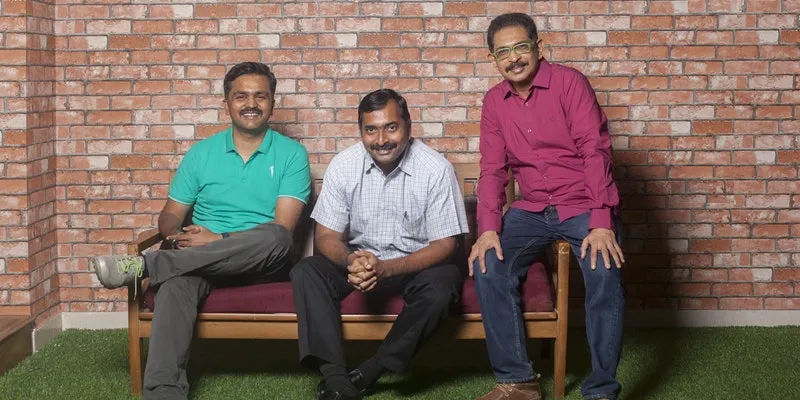How Boonbox is giving a fillip to rural ecommerce with its last-mile delivery services
Chennai-based Boonbox is a logistics startup that is focussing on consumers living in towns and villages with a population of 30,000 and below, and is also reaching those who live in locations without a proper address or pincode.
Today, the tradition of shopping in Tier II and Tier III cities in India is slowly changing. Rural India is spending more time online, thanks to affordable smartphones and cheap data plans.
But on-ground realities and challenges narrate a different story, making it tough for marketplaces and sellers to deliver to and engage with customers in semi-urban and rural India.
This led 41-year old Karthik Natarajan to come up with the idea of Boonbox. Karthik joined hands with Narayanan H and his former colleague from TVS Group, Ramachandran Ramanathan (Ram), and started Boonbox in 2013. An ecommerce venture of Inthree Access Services Pvt Ltd., Boonbox is a last-mile logistics network that delivers products to consumers in remote areas at their doorstep.
Through its assisted ecommerce model, the Chennai-based startup is also ensuring it follows up with after-sales service to ensure a top-class purchase experience to its consumers.

Boonbox founding team
How does it work?
Boonbox takes orders from customers through affiliates who have the Boonbox App downloaded on to their mobile phones. They then source the products directly from the OEMs and through a hub-and-spoke logistics capability, and deliver the products at customers’ doorsteps in remote areas.
“Our technology backbone has been curated for the peculiarities of the rural business – our apps are in local language, our last-mile app facilitates route mapping and optimisation in remote areas where genuine addresses do not exist, and our CRM is custom built to cater to our business requirements,” says Ram.
While Karthik and Ram were colleagues, they met Narayanan H, who had created the rural network in Tamil Nadu for Tata Teleservices, through a common friend, and immediately caught on to the power of the idea.
Speaking about the team, Ram says: “We built the team by selling a dream, which made many people leave their lucrative jobs in the corporate world to join the Boonbox adventure. The fact that we were working in an exotic area, a white space, building for Bharat, and also generating cash in the business, attracted people to our team.”
At present, there are around 450 people working with Boonbox.
Challenges
As the rural ecommerce space is still nascent, the team came up with the business model after multiple iterations.
“The business model is based on continuous learning and building on our experiences. It is not something that others can replicate over a short span of time,” says Ram.
However, Boonbox continues to work on two major challenges - gaining the trust of consumers living in towns and villages with a population of 30,000 and below, and catering to customers who live in locations without a proper address or pincode. In such areas, it’s important to ensure that products reach customers in time.
“We are the pioneers in this field, and we are continuously trying our experiments and learning from them. There have been as many failed experiments as successful ones, as our business itself is one huge hack,” says Ram.
The market and differentiator
Today, a new breed of ecommerce startups - from ShopX, LaYuva, Meesho, Shopmatic, Shyplite, Shop101, and GlowRoad, to Ezmall Zepo, Kartrocket, and Shopify, are helping small sellers ride India’s ecommerce wave by providing them with the back-end solutions they need without starting from scratch.
Bengaluru-based Playment is also crowdsourcing catalogue operations. Clearly, everyone has an eye on this market. There also is Delhi-based Mimo, which is focussed on last mile rural connectivity.
Speaking about the differentiating factor, Ram says,
“What sets us apart is that our business is fully focussed on rural markets – our target customers live in 30,000 population towns and below, till the smallest hamlet. We sell consumer durables (smart phones, white goods, electronic appliances) and other products to these individual customers at Market Operating Price (the price at which they would be able to buy the products if they travelled to a nearby town). We take orders from customers in 16 states and have the ability to deliver products in 3 lakh villages (47 percent of India’s universe of villages).”
Numbers and future
Since inception, Boonbox has sold products in rural markets totalling to Rs 450 crore, and the team expects the turnover to be in excess of Rs 300 crore during the current financial year.
The startup has also raised Series A funding led by Ventureast. Speaking of the investment, Siddhartha Das, General Partner, Ventureast, says, “Earlier, Ventureast had invested in Atyati Technologies, which was a technology platform for rural financial inclusion. As a continuing focus on that market, Boonbox presented an exciting opportunity as it is solving the problem of rural access to consumer brands, purchase financing and last mile doorstep delivery, all of which have been significant impediments in the growth of rural commerce.”
However, Ram believes this to be an emerging sector with a strong growth potential due to a multitude of factors. One is the smartphone penetration in rural markets enabling m-commerce. Secondly, digital technology contributing to increasing awareness and sophistication among rural customers and thirdly increased discretionary spend among rural customers beyond basic necessities.
“Boonbox is ideally positioned to capitalise on the opportunity as they are first movers in creating a pan-India rural infrastructure that would facilitate access, financing, and rural logistics,” says Ram.
(Edited by Megha Reddy)



![[Startup Bharat] How this ex-Google employee and his team are digitising co-operative credit societies in Kerala](https://images.yourstory.com/cs/2/3fb20ae02dc911e9af58c17e6cc3d915/KREDTeamBarclaysAccelerator1576582207003png?fm=png&auto=format&h=100&w=100&crop=entropy&fit=crop)
![[Year in Review 2019] 15 top Startup Bharat stories of 2019 that celebrate innovation across India](https://images.yourstory.com/cs/2/604090802d6d11e9aa979329348d4c3e/SBYE1574932256479png?fm=png&auto=format&h=100&w=100&crop=entropy&fit=crop)




